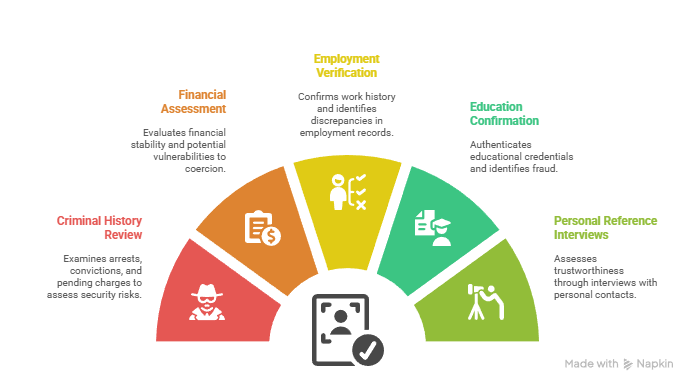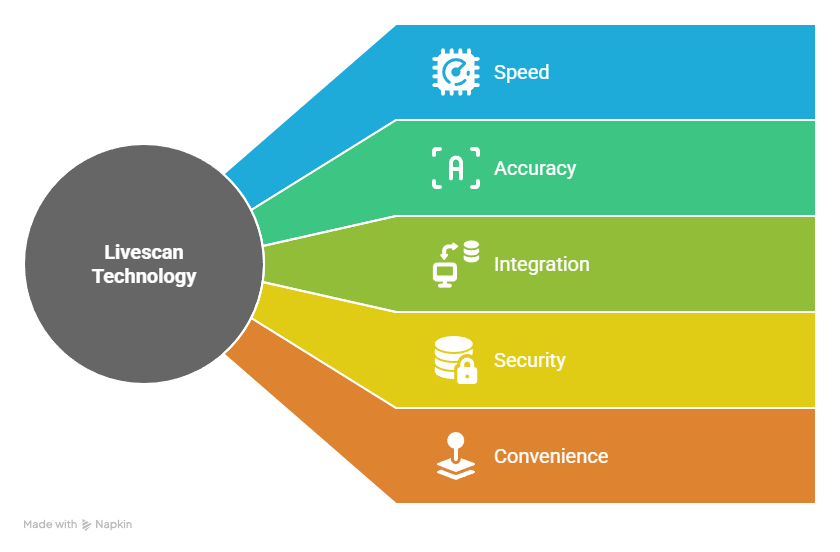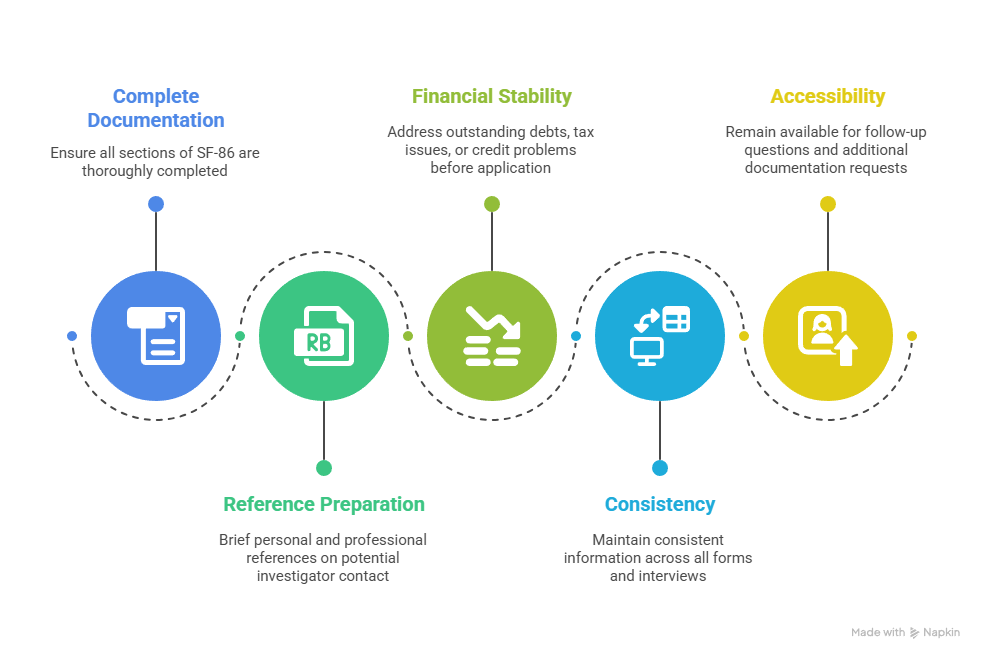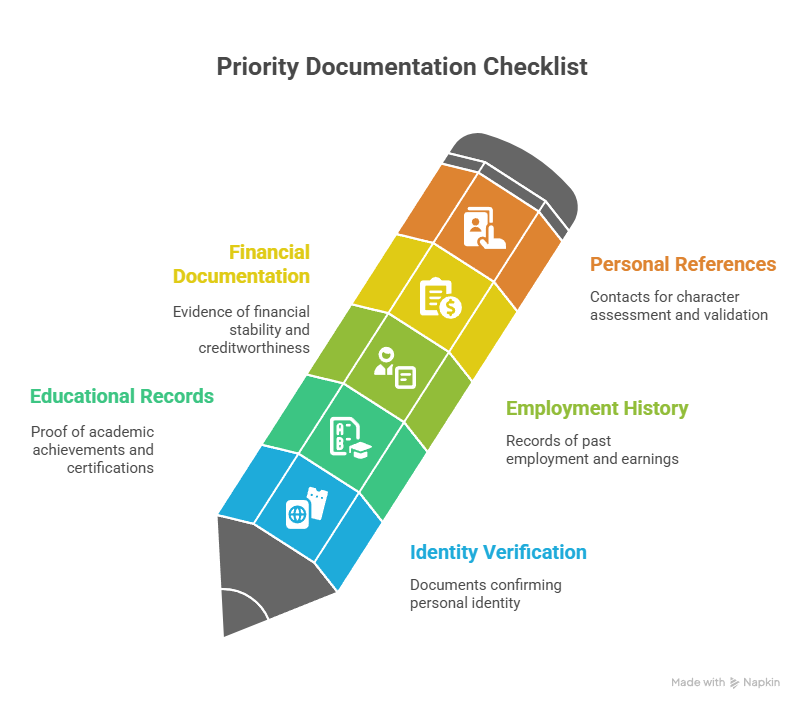Maryland's cybersecurity job market demands strategic navigation of comprehensive background checks, including CJIS Livescan fingerprinting and federal security clearances ranging from Confidential to Top Secret levels. The state's tax credit incentives for hiring cleared cybersecurity professionals create significant opportunities for both employers and job seekers willing to invest in the rigorous vetting process required for sensitive data protection roles.
Key Takeaways
- Maryland is a key center for cybersecurity due to its proximity to federal agencies and tech companies, making it a prime location for related careers.
- Successful job acquisition in the state requires understanding and navigating thorough background checks, including CJIS Livescan fingerprinting and security clearance processes.
- CJIS Livescan technology offers swift and precise fingerprinting, significantly speeding up the hiring timeline for cybersecurity roles.
- Security clearances are crucial for roles involving sensitive information and range from Confidential to Top Secret, often requiring detailed personal history submissions.
- Employers benefit from Maryland's tax credits for hiring cybersecurity professionals with clearances, encouraging investment in a skilled workforce and reducing hiring costs.
Introduction
Maryland's position as a cybersecurity hub, anchored by proximity to federal agencies and defense contractors, creates unique opportunities for professionals seeking security-focused careers. However, landing a cybersecurity role in the state requires navigating complex background check processes, security clearance requirements, and understanding available tax incentives. A Maryland cybersecurity background check involves multiple layers of verification, from CJIS Livescan fingerprinting to comprehensive federal investigations, making preparation and knowledge essential for success.
Understanding Maryland Cybersecurity Background Checks
A Maryland cybersecurity background check is a comprehensive security screening process designed to verify an individual's eligibility for positions involving sensitive data, government systems, or classified information. These investigations examine criminal history, financial stability, employment records, and personal associations to assess potential security risks. The process is governed by the Code of Maryland Regulations (COMAR) and federal guidelines, ensuring consistent standards across state and federal agencies.
Key Components of Maryland Cybersecurity Background Checks:

- Comprehensive searches across state and federal databases examine all arrests, convictions, and pending criminal charges throughout an applicant's adult life. These investigations often reveal traffic violations, misdemeanors, and felonies that could impact security clearance eligibility or employment decisions.
- Detailed credit reports and debt analysis evaluate an applicant's financial stability, payment history, and potential vulnerabilities to coercion or bribery. Financial difficulties, bankruptcies, or excessive debt can raise red flags about an individual's reliability and susceptibility to compromise.
- Thorough confirmation of work history includes verification of job titles, employment dates, performance evaluations, and interviews with supervisors and colleagues. This process validates claimed experience while identifying any discrepancies in employment records or performance issues that might affect job suitability.
- Rigorous verification of educational credentials includes degree authentication, transcript review, and validation of professional certifications or specialized training. Educational fraud or misrepresentation can disqualify candidates and raise questions about overall honesty and integrity.
- In-depth character assessments involve structured interviews with colleagues, supervisors, neighbors, and personal contacts who can speak to an applicant's trustworthiness and reliability. These interviews often reveal personal habits, associations, or behaviors that might not appear in official records but could impact security considerations.
The legal framework requires specific procedures for different security levels, with some positions mandating polygraph examinations or specialized investigations. Understanding these requirements early in your career planning can prevent delays and increase your marketability in Maryland's competitive cybersecurity sector.
Preparation Requirements
Successful completion of a Maryland cybersecurity background check requires meticulous preparation and complete documentation. Gather all relevant personal records, including tax returns, employment documentation, educational transcripts, and detailed address histories spanning the required timeframe. Any gaps in employment or residence must be thoroughly documented with explanations and supporting evidence.
| Document Type | Required Information | Retention Period |
| Employment Records | Job titles, dates, supervisor contacts, salary history | 10 years minimum |
| Financial Documents | Tax returns, credit reports, major purchases/sales | 7 years minimum |
| Educational Records | Degrees, certifications, transcripts, training completion | Permanent |
| Personal References | Contact information, relationship details, communication history | Current and accessible |
Proactive preparation includes reviewing your credit report for errors, addressing any outstanding legal issues, and ensuring all personal references are aware they may be contacted. The investment in thorough preparation significantly reduces processing delays and demonstrates the attention to detail valued in cybersecurity roles.
CJIS Livescan Technology
The Criminal Justice Information Services (CJIS) Livescan system represents Maryland's modernized approach to fingerprint collection and background screening for cybersecurity professionals. This digital fingerprinting technology captures high-resolution biometric data that integrates seamlessly with state and federal databases, eliminating traditional ink-and-paper delays. For cybersecurity candidates, Livescan processing typically reduces background check turnaround times from weeks to days, providing a competitive advantage in fast-moving hiring cycles.
Livescan Processing Benefits:

- Speed: Digital fingerprint processing delivers comprehensive background check results in 24-72 hours compared to 2-4 weeks required for traditional ink-and-paper methods. This accelerated timeline allows cybersecurity professionals to begin work sooner and helps employers fill critical positions without extended delays.
- Accuracy: Advanced digital capture technology eliminates the smudging, incomplete prints, and quality issues that frequently plague traditional ink fingerprinting methods. High-resolution optical scanning ensures clear, detailed images that meet federal standards and reduce the likelihood of processing errors or rejections.
- Integration: Seamless database connectivity with FBI and state criminal justice systems enables real-time information sharing and comprehensive record searches. This integration eliminates manual data transfer delays and ensures that all relevant criminal history information is captured during the screening process.
- Security: Advanced encryption protocols and tamper-proof digital records protect sensitive biometric data throughout the transmission and storage process. These security measures meet federal CJIS standards and provide assurance that personal information remains protected from unauthorized access or manipulation.
- Convenience: Maryland's network of over 50 certified Livescan locations provides convenient access throughout the state, with concentrated availability in major metropolitan areas. Extended operating hours and appointment scheduling options accommodate working professionals' schedules and reduce travel time for background check processing.
The system's efficiency particularly benefits cybersecurity professionals pursuing multiple clearance levels simultaneously, as Livescan records can be referenced across different agencies without re-fingerprinting. This streamlined approach supports Maryland's goal of building a robust cybersecurity workforce while maintaining rigorous security standards.
Livescan Locations and Requirements
Maryland maintains certified Livescan facilities throughout the state, with concentrated availability in the Baltimore-Washington corridor where most cybersecurity employers operate. Appointments are required at most locations, and popular facilities near major defense contractors often book weeks in advance, making early scheduling essential for time-sensitive applications.
Required Documentation for Livescan Appointments:
- Government-issued photo identification: Driver's license, passport, or military ID
- Completed background check request forms: Specific to your employer or agency requirements
- Payment: Typically $20-$40, with exact fees varying by location and check type
- Employment authorization: If required by your specific position or security level
Advanced scheduling and backup location options help ensure your Maryland cybersecurity background check process remains on track, particularly when coordinating with offer deadlines or clearance renewal timelines.
Security Clearance Essentials
Security clearances form the backbone of Maryland's cybersecurity employment landscape, with different levels determining access to classified information and systems. The three primary clearance levelsâConfidential, Secret, and Top Secretâeach require increasingly rigorous investigation processes and ongoing maintenance requirements. Understanding which clearance level your target roles require helps focus your preparation efforts and career planning strategies.
| Clearance Level | Investigation Scope | Processing Time | Reinvestigation Frequency |
| Confidential | Basic criminal/credit check | 2-4 months | 15 years |
| Secret | Comprehensive background investigation | 4-8 months | 10 years |
| Top Secret | Extensive investigation including interviews | 8-18 months | 5 years |
The clearance process begins with Standard Form 86 (SF-86), a detailed questionnaire covering personal history, finances, foreign contacts, and potential security concerns. Accuracy and completeness are critical, as inconsistencies or omissions can result in delays, additional investigations, or clearance denial. The investment in obtaining security clearance significantly enhances career opportunities and earning potential in Maryland's cybersecurity sector.
Clearance Application Process
The security clearance application process requires systematic preparation and attention to detail throughout multiple phases of investigation. Initial submission of SF-86 triggers automated database checks, followed by field investigations that may include interviews with references, neighbors, and colleagues. Applicants must remain accessible and responsive throughout the process, as delays in providing additional information can extend timelines significantly.
Critical Success Factors:

- Ensuring all sections of SF-86 are thoroughly completed with no gaps or omissions represents the foundation of successful clearance applications, as incomplete submissions trigger automatic delays and additional scrutiny from investigators.
- Briefing personal and professional references on potential investigator contact helps prepare them for detailed questions about your character, reliability, and any security concerns that may arise during the background investigation process.
- Addressing outstanding debts, tax issues, or credit problems before submitting your application demonstrates financial responsibility and eliminates common red flags that frequently result in clearance denials or extended processing times.
- Maintaining consistent information across all forms and interviews builds investigator confidence in your reliability and honesty, while discrepancies between documents can raise serious questions about your suitability for security clearance.
- Remaining available for follow-up questions and additional documentation requests throughout the investigation period ensures smooth processing and demonstrates the responsiveness expected of cleared cybersecurity professionals.
Successful clearance holders must understand ongoing obligations, including reporting requirements for foreign travel, financial changes, and legal issues that could impact their security status. This ongoing responsibility is balanced by significantly enhanced career opportunities and competitive compensation in Maryland's cybersecurity market.
Maryland Cybersecurity Tax Credits
Maryland's cybersecurity tax credit program incentivizes employers to hire security-cleared professionals by providing substantial tax benefits for qualifying positions. The Cybersecurity Investment Incentive Tax Credit offers up to $20,000 per employee annually, with higher amounts available for professionals holding Top Secret clearances or specialized certifications. These incentives make Maryland particularly attractive to both cybersecurity companies and professionals seeking stable, well-compensated career opportunities.
Tax Credit Structure by Clearance Level:
- No Clearance Required: Up to $3,000 per qualified cybersecurity professional
- Secret Clearance: Up to $7,000 per employee annually
- Top Secret Clearance: Up to $10,000 per employee annually
- Top Secret/SCI: Up to $15,000 per employee annually
- Specialized Certifications: Additional $5,000 for qualifying credentials
Employers can combine these credits with other Maryland business incentives, creating compelling packages that attract top cybersecurity talent while reducing operational costs. The program's success has contributed to Maryland's growing reputation as a cybersecurity hub, with many companies relocating or expanding operations to take advantage of these financial benefits.
Employer Application Process
Companies seeking to leverage Maryland's cybersecurity tax credits must navigate a structured application process that requires documentation of employee qualifications and ongoing compliance monitoring. The Maryland Department of Commerce administers the program, with applications processed on a first-come, first-served basis within annual funding limits. Employers must demonstrate that positions qualify as cybersecurity roles and that employees meet clearance or certification requirements.
Organizations should begin the application process immediately upon hiring qualified cybersecurity professionals, as retroactive applications are not permitted. Detailed record-keeping of employee credentials, job responsibilities, and compensation ensures smooth annual recertification and maximizes available tax benefits throughout the credit period.
The Cybersecurity Screening Process
Maryland's cybersecurity screening process integrates state and federal requirements into a comprehensive evaluation system designed to protect sensitive information and critical infrastructure. The process typically begins with initial employer screening, followed by formal background investigations that may involve multiple agencies depending on the position's security requirements. Federal agencies like the Office of Personnel Management (OPM) often conduct portions of the investigation, creating a collaborative approach between state and federal security officials.
Screening Timeline and Milestones:
- Initial Application: 1-2 weeks for document review and preliminary screening
- Livescan Fingerprinting: 24-72 hours for results processing
- Federal Background Investigation: 3-12 months depending on clearance level
- Adjudication: 30-90 days for final security determination
- Clearance Activation: 1-2 weeks for system access and badge processing
Understanding these timelines helps cybersecurity professionals plan career transitions and manage expectations during the hiring process. Employers often provide conditional offers contingent on successful completion of background checks, making early initiation of the screening process crucial for maintaining momentum in job searches.
Documentation Requirements
Comprehensive documentation forms the foundation of successful Maryland cybersecurity background checks, requiring systematic organization and attention to detail throughout the process. Essential documents include educational transcripts, professional certifications, employment verification letters, and detailed financial records spanning the investigation period. Missing or incomplete documentation represents the primary cause of processing delays, making thorough preparation essential.

Digital organization of these documents facilitates quick response to investigator requests and demonstrates the organizational skills valued in cybersecurity roles. Maintaining current versions of all documents ensures accuracy and reduces the likelihood of delays during the screening process.
Impact on Maryland's Cybersecurity Workforce
The comprehensive background check and clearance system significantly shapes Maryland's cybersecurity employment landscape, creating both opportunities and challenges for workforce development. High security standards attract federal contracts and sensitive projects, generating demand for cleared professionals and supporting premium compensation levels. However, lengthy clearance processes can create hiring bottlenecks, particularly for entry-level positions where candidates lack existing security credentials.
Tax credit incentives help offset these challenges by encouraging employers to sponsor clearance processing for promising candidates and invest in workforce development programs. The result is a mature cybersecurity ecosystem where experienced professionals enjoy exceptional career mobility, while newcomers benefit from employer-sponsored clearance programs and mentorship opportunities. Maryland's approach balances security requirements with economic development goals, creating sustainable growth in the cybersecurity sector.
Conclusion
Maryland's cybersecurity background check system, anchored by CJIS Livescan technology and comprehensive security clearance processes, creates a rigorous but rewarding pathway for cybersecurity professionals. The state's tax credit programs incentivize employer investment in cleared personnel, while streamlined digital processing reduces traditional barriers to entry. Success in Maryland's cybersecurity sector requires thorough preparation, attention to detail, and understanding of the interconnected systems that protect both sensitive information and career opportunities.
Frequently Asked Questions
What documents do I need for a Maryland cybersecurity background check?
You need government-issued IDs, educational transcripts, certifications, and sometimes financial disclosures. These validate your identity and qualifications.
How long does it take to complete a CJIS Livescan in Maryland?
Results from a Livescan can come back in a few days, offering a quicker alternative to traditional fingerprinting methods. Still, it can vary by specific agency processes.
What are common reasons for security clearance denial?
Financial issues, criminal records, or inconsistencies in your application often lead to denial. It's crucial to be transparent and accurate in your submissions.
Can I appeal a security clearance denial?
Yes, you can appeal through the review process provided by the agency. Prepare to submit additional information or clarify discrepancies linked to your application.
Are there tax credits for hiring cybersecurity professionals in Maryland?
Yes, Maryland offers tax credits to companies hiring cleared professionals. Check specific eligibility criteria and application procedures to claim these incentives.
Do I need a security clearance for all cybersecurity roles?
Not all roles require a clearance, but those involving sensitive data often do. Verify the specific needs of the position you are applying for.
Additional Resources
- Understanding Security Clearances
https://cybersecurityguide.org/resources/security-clearance/ - Background Checks â Maryland Department of Public Safety and Correctional Services
https://www.dpscs.state.md.us/publicservs/bgchecks.shtml - Regulatory Services: Background Check Process
https://dls.maryland.gov/pubs/prod/NoPblTabPDF/RegServices25.pdf

GCheck Editorial Team
Meet the GCheck Editorial Team, your trusted source for insightful and up-to-date information in the world of employment background checks. Committed to delivering the latest trends, best practices, and industry insights, our team is dedicated to keeping you informed.
With a passion for ensuring accuracy, compliance, and efficiency in background screening, we are your go-to experts in the field. Stay tuned for our comprehensive articles, guides, and analysis, designed to empower businesses and individuals with the knowledge they need to make informed decisions.
At GCheck, we're here to guide you through the complexities of background checks, every step of the way.





